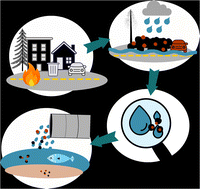Wildland–urban interface wildfire increases metal contributions to stormwater runoff in Paradise, California†
Abstract
The 2018 Camp Fire was a large late-year (November) wildfire that produced an urban firestorm in the Town of Paradise, California, USA, and destroyed more than 18 000 structures. Runoff from burned wildland areas is known to contain ash, which can transport contaminants including metals into nearby watersheds. However, due to historically infrequent occurrences, the effect of wildland-urban interface (WUI) fires, such as the Camp Fire, on surface water quality has not been well-characterized. Therefore, this study investigated the effects of widespread urban burning on surface water quality in major watersheds of the Camp Fire area. Between November 2018 and May 2019, 140 surface water samples were collected, including baseflow and stormflow, from burned and unburned watersheds with varying extent of urban development. Samples were analyzed for total and filter-passing metals, dissolved organic carbon, major anions, and total suspended solids. Ash and debris from the Camp Fire contributed metals to downstream watersheds via runoff throughout the storm season. Increases in concentration up to 200-fold were found for metals Cr, Cu, Ni, Pb, and Zn in burned watersheds compared to pre-fire values. Total concentrations of Al, Cd, Cu, Pb, and Zn exceeded EPA aquatic habitat acute criteria by up to 16-fold for up to five months after the fire. To assess possible transport mechanisms and bioavailability, a subset of 18 samples was analyzed using four filters with nominal pore sizes ranging from 0.22 to 1.2 μm to determine the particulate size distribution of metals. Trace and major metals (Al, Ba, Co, Cr, Cu, Fe, Hg, Mn, Ni, Pb, and Zn) were found mostly associated with larger grain sizes (>0.45 μm), and some metals (Al, Cr, Fe, and Pb) also included a substantial colloidal phase (0.22 to 0.45 μm). This study suggests that fires in the wildland–urban interface increase metal concentrations, mainly through particulate driven transport. The metals with the largest increases are likely from anthropogenic disaster materials, though biomass ash also is a major contributor to water quality. The increase in metals following WUI burning may have adverse ecological impacts.

- This article is part of the themed collection: Contaminant remediation and fate


 Please wait while we load your content...
Please wait while we load your content...
